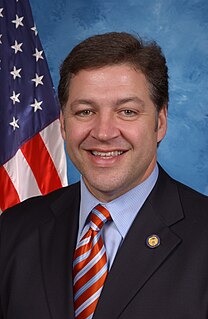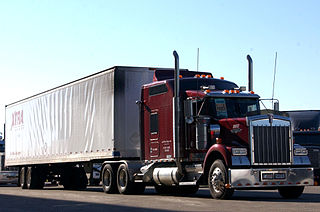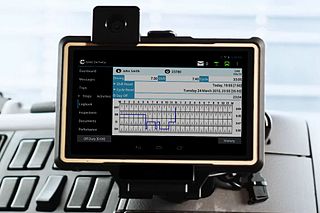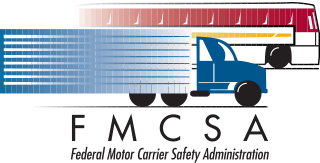
Anna A. Georges Eshoo is the U.S. Representative from California's 18th congressional district, serving since 1993. She is a member of the Democratic Party. The district, numbered as the 14th District from 1993 to 2013 is based in the Silicon Valley, including the cities of Redwood City, Sunnyvale, Mountain View, and Palo Alto, as well as part of San Jose. She is the only Assyrian American in Congress, and is also one of only two congresswomen of Armenian descent, with Jackie Speier being the other. She is Assyrian paternally and Armenian maternally.

William Franklin Shuster is an American politician who served as the U.S. Representative for Pennsylvania's 9th congressional district from 2001 to 2019. He is a member of the Republican Party, and is a son of former Congressman Bud Shuster.

John Randolph Thune is an American politician serving as the senior United States Senator from South Dakota, a seat he was first elected to in 2004. A member of the Republican Party, he previously served as the U.S. Representative for South Dakota's at-large congressional district from 1997 to 2003.
The Low Income Home Energy Assistance Program (LIHEAP) is a United States federal social services program first established in 1981 and funded annually through Congressional appropriations. The mission of LIHEAP is to assist low income households, particularly those with the lowest incomes that pay a high proportion of household income for home energy, primarily in meeting their immediate home energy needs. The program, part of the United States Department of Health and Human Services (HHS), is funded by grants appropriated from the federal government.

The Energy Policy and Conservation Act of 1975 (EPCA) is a United States Act of Congress that responded to the 1973 oil crisis by creating a comprehensive approach to federal energy policy. The primary goals of EPCA are to increase energy production and supply, reduce energy demand, provide energy efficiency, and give the executive branch additional powers to respond to disruptions in energy supply. Most notably, EPCA established the Strategic Petroleum Reserve, the Energy Conservation Program for Consumer Products, and Corporate Average Fuel Economy regulations.
A moving scam is a scam by a moving company in which the company provides an estimate, loads the goods, then states a much higher price to deliver the goods, effectively holding the goods as lien.

The Energy Independence and Security Act of 2007 is an Act of Congress concerning the energy policy of the United States. As part of the Democratic Party's 100-Hour Plan during the 110th Congress, it was introduced in the United States House of Representatives by Representative Nick Rahall of West Virginia, along with 198 cosponsors. Despite Rahall becoming 1 of only 4 Democrats to oppose the final bill, it passed in the House without amendment in January 2007. When the Act was introduced in the Senate in June 2007, it was combined with Senate Bill S. 1419: Renewable Fuels, Consumer Protection, and Energy Efficiency Act of 2007. This amended version passed the Senate on June 21, 2007. After further amendments and negotiation between the House and Senate, a revised bill passed both houses on December 18, 2007 and President Bush, a Republican, signed it into law on December 19, 2007, in response to his "Twenty in Ten" challenge to reduce gasoline consumption by 20% in 10 years.
The Highway Trust Fund is a transportation fund in the United States which receives money from a federal fuel tax of 18.4 cents per gallon on gasoline and 24.4 cents per gallon of diesel fuel and related excise taxes. It currently has two accounts, the Highway Account which funds road construction and other surface transportation projects, and a smaller 'Mass Transit Account' which supports mass transit. Separate from the Highway Trust Fund is the 'Leaking Underground Storage Tank Trust Fund', which receives an additional 0.1 cents per gallon on gasoline and diesel, making the total amount of tax collected 18.5 cents per gallon on gasoline and 24.5 cents per gallon on diesel fuel. The Highway Trust Fund was established in 1956 to finance the United States Interstate Highway System and certain other roads. The Mass Transit Fund was created in 1982. The federal tax on motor fuels yielded $28.2 billion in 2006.

Hours of Service (HOS) regulations are issued by the Federal Motor Carrier Safety Administration (FMCSA) and govern the working hours of anyone operating a commercial motor vehicle (CMV) in the United States. These regulations apply to truck drivers, commercial and city bus drivers, and school bus drivers who operate CMVs. These rules limit the number of daily and weekly hours spent driving and working, and regulate the minimum amount of time drivers must spend resting between driving shifts. For intrastate commerce, the respective state's regulations apply.

The trucking industry serves the American economy by transporting large quantities of raw materials, works in process, and finished goods over land—typically from manufacturing plants to retail distribution centers. Trucks are also used in the construction industry, as dump trucks and portable concrete mixers move the large amounts of rocks, dirt, concrete, and other building materials used in construction. Trucks in America are responsible for the majority of freight movement over land and are tools in the manufacturing, transportation, and warehousing industries.

An electronic on-board recorder (EOBR) is an electronic device attached to a commercial motor vehicle, which is used to record the amount of time a vehicle is being driven. This is similar to the tachograph, and is the American equivalent of the digital tachograph used in Europe. Trucks in the European Union are required to have digital tachographs installed, and are securely monitored by government agencies. However, in Europe, the new digital tachograph which is considered secure, can be tricked with a round magnet placed by drivers over the connection to the transmission box. Usually they tie a rope to that magnet, and with a simple pull, the magnet will disengage and will show that the driver started moving about half an hour ago . The majority of carriers and drivers in the United States currently use paper-based log books. On January 31, 2011, the U.S. Federal Motor Carrier Safety Administration (FMCSA) proposed a rule requiring Electronic On-Board Recorders for interstate commercial truck and bus companies. The proposed rule covers interstate carriers that currently use log books to record driver's hours of service. The proposal would affect more than 500,000 carriers in the United States and carriers that currently use time cards would be exempt.
The motor carrier safety rating is an evaluation given to an interstate commercial motor carrier by the Federal Motor Carrier Safety Administration (FMCSA).

An auto transport broker is a type of cargo broker that specializes in the shipping and transportation of vehicles. Most vehicles shipped in the U.S. are cars and trucks, but many brokers handle boats, RVs, motorcycles and other types of vehicles as well. Auto transport is classified as "specialized freight trucking" under NAICS code 484230.
The Energy and Water Development and Related Agencies Appropriations Act, 2014 refers to appropriations bills introduced during the 113th United States Congress. There are two different versions: H.R. 2609 in the House of Representatives and S. 1245 in the Senate. The bill was later incorporated as Division D of the Consolidated Appropriations Act, 2014, which was enacted in January 2014.

Public Law 113-45 is an American Act of Congress which requires that the Federal Motor Carrier Safety Administration go through the standard rulemaking proceeding, allowing comment from the public and the trucking industry, before it sets any requirements for truck drivers related to sleep apnea. It was introduced in the United States House of Representatives during the 113th United States Congress and was signed into law by President Barack Obama in October 2013.

The Home Heating Emergency Assistance Through Transportation Act of 2014 or HHEATT Act of 2014 is an act that created an emergency exception to existing Federal Motor Carrier Safety Administration (FMCSA) regulations. The exceptions allow truckers to drive for long hours if they are delivering home heating fuels, such as propane, to places where there is a shortage. The exemption lasts until May 31, 2014. An existing suspension was scheduled to expire on March 15, 2014.

The Energy and Water Development and Related Agencies Appropriations Act, 2015 is a bill that would make appropriations for energy and water development and related agencies for FY2015. The bill would appropriate $34 billion, which is only $50 million less than these agencies currently receive. The appropriations for the United States Department of Energy and the United States Army Corps of Engineers are made by this bill.

The Unlocking Consumer Choice and Wireless Competition Act is a United States public law that repeals a rulemaking determination by the United States Copyright Office that left it illegal for people to unlock their cellphones.













